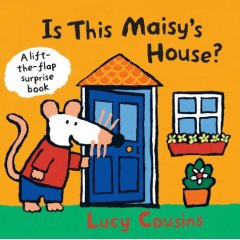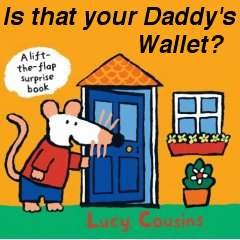 You ever have one of those parenting moments that stops you dead in your tracks, and you break out in a cold sweat? Like when you find yourself agreeing with New York Magazine sex-makes-babies columnist Amy Sohn about something? Sohn and her husband have differing views on letting their 20-mo kid D watch TV: she's generally ambivalent to the idea, until she comes across Susan Gregory Thomas's book, Buy Buy Baby: How Consumer Culture Manipulates Parents and Harms Young Minds:
You ever have one of those parenting moments that stops you dead in your tracks, and you break out in a cold sweat? Like when you find yourself agreeing with New York Magazine sex-makes-babies columnist Amy Sohn about something? Sohn and her husband have differing views on letting their 20-mo kid D watch TV: she's generally ambivalent to the idea, until she comes across Susan Gregory Thomas's book, Buy Buy Baby: How Consumer Culture Manipulates Parents and Harms Young Minds:
I read it cover to cover the night I got it: in the living room as I fed D in front of The Simpsons, in the bathroom as she flipped through her waterproof Elmo storybook, in my bedroom after I read her one of her twenty Maisy board books. And I got scared.The twenty Maisy board books reference did it for me. As it happens, the kid and I were at the library this morning, returning her first book and test-reading some others to bring home. I'd already refused to read a Dora book to her with the line, "Dora stays on TV, kid-o," but then a few minutes later, as we were working our way through a basket of boardbooks, she pulled out a book called, Is This Maisy's House?, and I figured, she's never seen Maisy on TV, one read wouldn't hurt.Thomas argues that marketers are aggressively pursuing zero-to-3-year-olds with TV shows that claim to be educational but are really about creating character recognition and selling toys. In a chapter called “Elmo’s World,” about the licensing of TV characters, she detailed the money that Nickelodeon has made from Dora: In 2005, it raked in $250 million from her video sales alone. And 12 percent of Nickelodeon’s total profit came from licensing revenues (other networks average about 2 percent). I began to wonder whether Dora the Explorer was just teaching D to love Dora.
 The book is crap, a pointless tour through a bunch of surprise flap pages disguised as a search for Maisy. There are four meaningless items per spread that the kid's supposed to find in the picture; we didn't even bother. As we were reading it, and I thought about the irrelevant but ostensibly beneficial picture matching, it occurred to me that the real purpose of the book was exactly what Thomas said: building character recognition. And that pissed me off.
The book is crap, a pointless tour through a bunch of surprise flap pages disguised as a search for Maisy. There are four meaningless items per spread that the kid's supposed to find in the picture; we didn't even bother. As we were reading it, and I thought about the irrelevant but ostensibly beneficial picture matching, it occurred to me that the real purpose of the book was exactly what Thomas said: building character recognition. And that pissed me off.
I'd wondered about that long before the kid started asking for a Zoey diaper, because Zoey's her favorite, while her Huggies-wearing cousin prefers Ariel. I still wait to see the CTW/P&G research that shows the character awareness value of putting Muppets on newborn Pampers.
TV or Not TV [nymag]

What I find strange is how pushing against this pervasive marketing is so strongly generational. Both sets of our parents literally think we are insane when we insist on having no licensed character crap, and they work ceaselessly to introduce it behind our back and against our will. They have all been accommodating of our dietary requests and every other choice we've made, but they seem to view our withholding of television and marketing material as tantamount to neglect.
I don't have the research to back it up, but I have little doubt that those images get turned into persistent neural pathways at a very, very young age.
I don't think the issue is if a toy/book has a licensed character or not. It is if the toy/book is any good or not. Many licensed products are rushed out to market, and are not up to snuff. But so are many non-licensed products. So you just need (as always) to be aware and evaluate the quality of the product before buying it.
[I think those are two issues. I imagine our Miss Spider's ABC boardbook reinforces character recognition, too, but it's beautifully done, and it taught the kid to say "ogle" and "mingle" when she was a year old, which cracked us up. -ed.]
Seeing that my 4yo is now requesting Grammar Rock and we succumbed to purchasing the Whole Enchilada DVD probably because we had out neurotransmitter burned with Conjunction Junction every saturday morning. Now, 25 some years later, we are buying Schoolhouse Rocks.
But then again Elmo just loves his goldfish and Schoolhouse Rocks would say Red Furry Elmo greatly loves his gold goldfish and his vivid crayons.
I think the Maisy board books are for much younger kids, probably preverbal. We had a couple when Roo was about a year old but she doesn't revisit them much these days. And she's only occasionally interested in watching the Maisy cartoon on Noggin, although she liked it when she was in the 12-18 month zone. And I must admit I like the way they're drawn.
Now Roo only likes She-Ra DVDs, which comes with its own marketing/consumerist issues. Like a never-ending supply of characters and figures that were available in, like, 1985. Still, I love that she's asking me to find her a Castaspella nightgown in lieu of Cinderella these days.
Naomi, your reply made me laugh. My husband and I were both He-Man fans in the 80s and I suspect there will be at least one He-Man dvd in our girl's future. It's a practice I commonly refer to as "our crap was better than your crap". ;)
Does anyone know who pays who for the diaper licensing? I can't figure out who benefits more, CTW/Disney or Pampers/Huggies. I've yet to know a parent who buys diapers for the characters. Although I do admit to being preferential to the Spiderman swimming Pampers for the little guy.
Before I had kids I used to do a storytime twice a week for kids at the local B&N. I would read a few books I had chosen and then take requests. My choices were occasionally subversive, (Click, Clack, Moo) or just charming (anything by Moira Kalman). It was, however, depressing to watch the kids pick out their books; obvious crap but containing their favorite TV characters (Dora and Maisy were only two of the most offensive). The vast majority of the stuff was drivel and offered nothing except the opportunity to line the pockets of licensees. I swore that my children would not be a part of that.
As a part of that choice, our son, two and a half now, was kept from TV until about six months ago. It was interesting because even though his grandparents indulged him with Nemo bathtoys and Hokey-Pokey Elmos he had no idea what their context was. He merely created his own stories to go along with them. But since he began his television "indoctrination" his own stories have started to slip away. Sesame Street has wreaked havoc on his imagination. He would rather follow the stories created for him than discover his own (yeah, I know, shock of shocks), though we have yet to face the onslaught of "I want Elmo" crap.
A good portion of the "educational" programming from which most of this ancillary waste derives is, itself, crap. The funny thing is the program my son most enjoys and that I find myself watching just as delightedly because it is so fresh and genuine doesn't have any merchandise available. And we have looked. Kipper (we get it on Sprout) is simple and yet charming, even magical at times and has never struck me as a "marketing" idea. The perfect reason to get a doll or t-shirt and I can't.
This is interesting to me, because we don't have a tv, so have never seen Maisy or Dora, etc., and neither has my son. I didn't know when I first saw the books at the library that they referred to television characters (although after 18 months I have figured out Dora and Elmo through exposure to other families). But I thought it was strange that there were so many copies of such boring books.
[why do the Berenstain Bears suddenly pop into my head when I read that? -ed.]
I don't think the issue is necessarily if the books have educational (or other) value despite being licensed -- many do, and you could even argue that Dora stuff is empowering for little girls, I suppose.
The problem I have with all this stuff is it's designed to get the kids into the branding world and then sort of ramp them up and transition them to big-kid brands, etc. as they get older.
My wife and I both grew up with tons of characters marketing (albeit not to the degree there is now) bombarding our brains, and we both watched a lot of TV; it's not like we've suffered any sort of developmental setbacks because of it, but what bugs me is that so many of my memories are of stuff I saw on TV, or of collecting some popular toy (Star Wars figures, Smurfs, etc.) and not of my own adventures. Now that there's kids' stuff on almost 24 hours/day thanks to cable I can only see it getting worse. (Thank god my parents took us camping 4 weeks every year and bought us lots of Lego...)
My daughter, just like arlopop's son above, was kept from the TV more or less until she hit about 2, and still isn't hugely interested in what she sees on it. Part of that is because we're bringing her up in my wife's language and not English -- show her a Japanese show and she's engrossed -- but she does understand English, and it just seems that stuff like Elmo doesn't really engage her or excite her much. Hopefully there's a lasting effect... I don't necessarily want her to be totally disconnected from pop culture as that's the only real culture we have in North America, but she doesn't need to live and breath Dora and Nemo.
How about everything in moderation? Although I don't condone hours of unchecked TV watching, both my husband and I logged many hours of tube time as kids and..guess what? We still have imaginations! In fact, we're both writers (for TV...is that bad? Pays good, at least...)